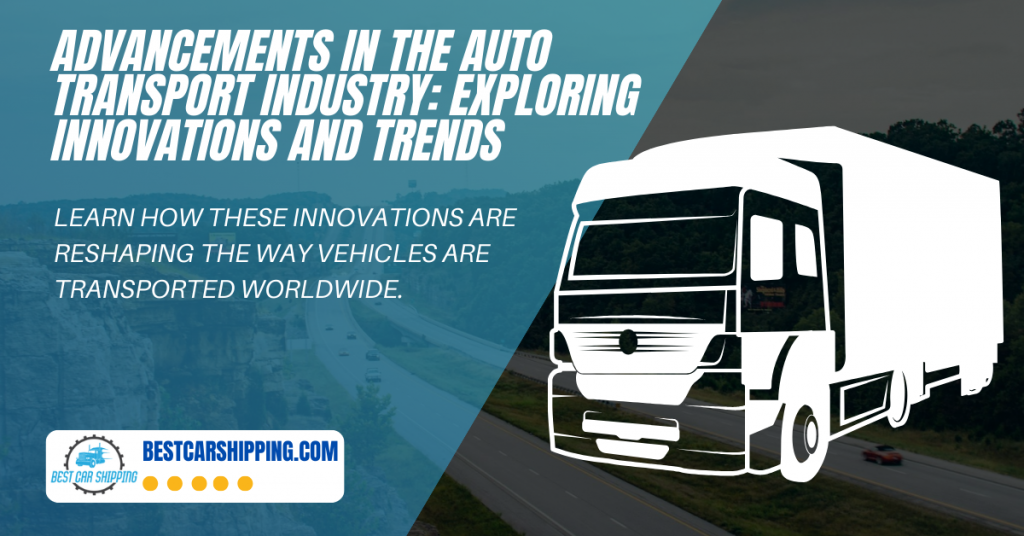In the wake of the technological revolution, the auto transport industry has seen an influx of groundbreaking innovations and trends that are reshaping the way vehicles are transported. From enhancing safety measures to boosting profitability, these progressive developments are setting new paradigms in the sector. This article aims to delve deeper into the contemporary trends and pioneering innovations that are sculpting the face of today’s car shipping industry.
The AI Revolution in Auto Transport
Artificial Intelligence (AI) is a transformative technology that has permeated various industries, and auto transport is no exception. The auto transport industry has seen a significant improvement in safety and efficiency thanks to AI. AI-powered algorithms now monitor traffic delays, allowing drivers to find alternative routes and minimize hold-ups, improving overall transportation timelines. This not only saves time but also reduces fuel consumption. AI is also employed in autonomous vehicles, enabling them to detect obstacles and analyze driver behavior, leading to safer and more intelligent road navigation.
Autonomous Vehicles: The Next Frontier
Autonomous (self-driving) vehicles, capable of functioning independently, are revolutionizing the auto transport industry. The incorporation of autopilot features in vehicles by leading auto brands like Tesla is signaling the future of autonomous transportation.While autonomous vehicles are still in testing phases in many countries, they promise greater accuracy, reduced human errors, and minimal emissions. By functioning independently, these vehicles are projected to contribute significantly to sustainable transportation solutions.
These smart vehicles necessitate changes in the transport process, such as new methods for loading and unloading, as well as specialized hardware and software to interact with these vehicles.While the introduction of autonomous vehicles presents certain challenges, it also offers substantial opportunities. By eliminating human error, autonomous vehicles could significantly streamline and improve the efficiency of the auto transportation process.
Electric Vehicles: A Green Future
The advent of electric vehicles has brought about a significant shift in the auto transport industry. These vehicles are not just eco-friendly but also safer compared to their gasoline counterparts. By eliminating the need for gasoline, electric cars significantly reduce emissions and contribute to a cleaner environment. Moreover, with advancements in self-drive technology, electric vehicles can mitigate human errors and enhance overall road safety.
Electric vehicles (EVs) are not without their own set of challenges, however. Unlike their gas-guzzling counterparts, EVs need specialized charging stations. As the proliferation of EVs continues, auto transport companies will need to invest in infrastructure that supports charging stations along transit routes to avoid shipment delays. This shift is not only transforming the way vehicles are transported but also the value chain of the auto industry, with the battery now accounting for nearly 40% of a car’s value.
With rising concerns over the environmental impact of transportation, the auto shipping industry is adopting green initiatives. These include investments in fuel-efficient carriers, reusable packaging materials, and carbon offset programs. The shift towards electric and hybrid vehicles is further driving down the carbon footprint of the auto transport sector. This trend signifies the industry’s commitment to adopting sustainable practices and reducing its environmental impact.
The electrification of cars and the need for innovative tech solutions have brought traditional automotive industry players and tech companies together. These diverse partnerships, born out of necessity, are driving the birth of different collaborations, bringing together diverse knowledge bases and operational styles to create revolutionary solutions for the auto transport industry.
Smart Traffic Management: A Leap Toward Efficiency
Smart shipping has emerged as a solution to mitigate errors in auto transport.With the rise of connected vehicles and intelligent transport systems, the potential for smart traffic management to enhance auto transport efficiency is enormous. These sophisticated systems leverage real-time data analysis and machine learning algorithms to optimize traffic flow, thereby reducing congestion and minimizing shipment delays.This technological advancement will have a profound impact on the car shipping industry, enabling faster, more efficient routes, while reducing the likelihood of accidents and damage to vehicles during transport.
IoT’s Role in Auto Transportation
The Internet of Things (IoT) has transformed the vehicle shipping industry by enabling real-time tracking and gathering of data about auto performance and condition. Efficient route planning to avoid traffic delays, reduce congestion, and promote fuel efficiency is made possible by IoT applications. Additionally, these applications can detect speed limits, vehicle health, driver safety, and fuel levels, thereby enhancing overall road safety.
Revolutionizing Auto Shipping with Transportation Management Systems
Transportation Management Systems (TMS) have revolutionized the auto transport industry by automating functions and optimizing resource utilization. Real-time tracking of shipments, inventory, and drivers ensures enhanced visibility and efficiency in the supply chain. TMS data analytics and insights contribute to achieving cost-effectiveness and maximizing profits.
As customer expectations continue to rise, so too do the shipping standards within the auto transportation industry. The technological revolution is reshaping the customer experience, creating a much more user friendly way of booking and managing vehicle shipments. Online platforms have dramatically simplified the process of scheduling auto transportation. Customers can now compare quotes, services, and even track their vehicles in real-time from a range of providers within minutes.
Advanced features such as payment processing and digital documentation further streamline the auto transportation experience for both customers and service providers. This digital transformation is driving a customer-centric approach in the auto transport industry.
Navigating the Changing Tides
The auto transport industry has experienced rapid advancements and innovations in recent times, leading to safer, more efficient, and profitable operations. From AI and autonomous transportation to electric vehicles and IoT, these trends have transformed the way vehicles are transported worldwide. Change is the only constant, and the world of car shipping is no exception. With new technologies emerging and consumer expectations evolving, the industry must adapt and innovate to remain relevant. By embracing these changes and investing in new solutions, the auto transport industry is poised to meet the challenges of the future and continue to provide reliable, efficient, and sustainable vehicle transportation services for years to come.

